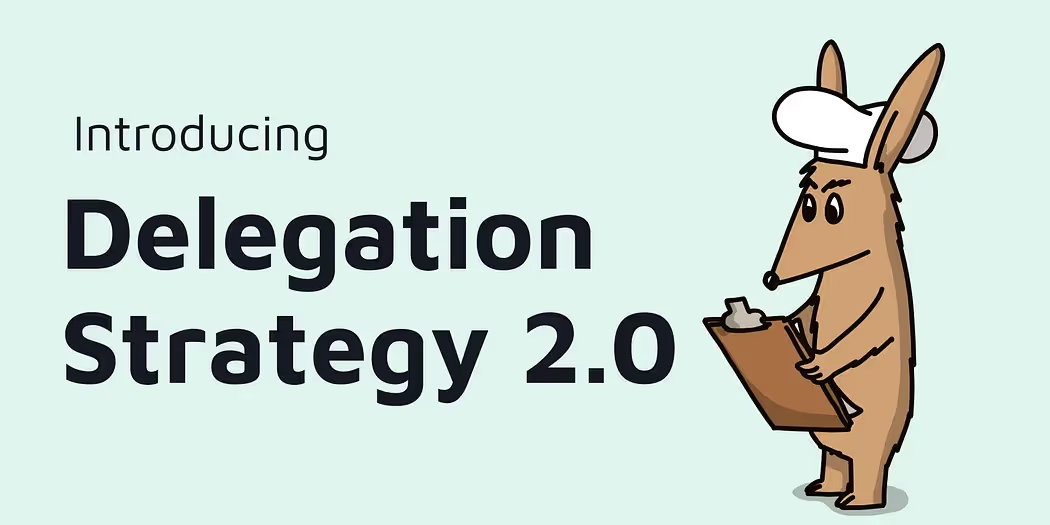Introducing a new-and-improved delegation formula for mSOL
Marinade just released a new version of its delegation strategy. Learn more about everything that changed.

Solana is in a much different place compared to when Marinade launched the network’s first stake pool in August, 2021. Now over 18 months later, Solana has matured and the network has grown more decentralized. There are now over 2,000 validators and the Nakamoto Coefficient is 32.
After consecutive updates to the protocol, and with a validator set growing healthier, the network is growing more performant. That has translated to faster epoch times, which in turn generates staking rewards more often. The blockchain itself has undergone numerous performance updates, introducing priority transactions and MEV opportunities.
Not everything has been rosy, though. The amount of liquid-staked SOL has not grown as fast as hoped. Still, only 2–3% of staked SOL is liquid-staked. And the price of SOL dropping in November during the FTX crash introduced a new economic reality for many independent validators.
These updates prompted Marinade to revisit its stake pool delegation strategy. Having closely analyzed its stake pool data over nearly two years, the Master Chefs have made informed decisions on how the stake pool can operate better for mSOL holders and the network overall while continuing to support more validators than any other stake pool.
In February, Master Chef LJ posted a detailed forum post outlining many of the changes designed to improve performance and transparency while supporting validators as best the stake pool can. For those who do not run validators or work closely on the technical side of Solana, these items may be difficult to digest. Here’s a summary of the new delegation strategy and why all of Solana can benefit from it.
Improving mSOL performance
Marinade is not only the first and largest stake pool, but it has always been permissionless, meaning any validator could be eligible for stake. That’s not changing, but the number of validators eligible for stake will decline, at least until the amount of SOL or economics improves.
For stakers, the fundamental benefits of Marinade are twofold:
The new strategy will prioritize performance along with decentralization, selecting the top 100 validators and not 400+. High-performing superminority validators are also eligible. Validators running the Jito client have already been eligible for Marinade stake and with the new delegation, the high performance will have an even greater impact on the pool’s APY, especially if more MEV opportunities become available as on-chain activity increases. Validators must also meet higher performance requirements in order to be eligible for Marinade gauges stake, which currently makes up 20% of the pool’s allocation.
Commission ruggers: Marinade has gone to great lengths to identify “commission ruggers.” This occurs when a validator raises their commission just before the epoch boundary in order to take more of the SOL staking rewards than their stakers expect. Many of these validators had gone undetected, but now thanks to new reporting from Marinade there is nowhere to hide. These validators who are caught are blacklisted from Marinade for good and will be flagged on the validator dashboard.
Updates for Validators
Marinade’s permissionless delegation strategy continues to support the Solana validator community more than any other stake pool.
The issue Marinade saw in the economics following FTX was the stake pool was delegating just a few hundred SOL to the validators at the end of the tail. While Marinade has prided itself on providing stake to as many validators as possible, as long as the stake pool remains the size that it is and SOL price is in this range, it makes more sense to support a smaller amount of validators so the Marinade stake makes a meaningful difference. For the time being, Marinade will stake to 100 validators via the algorithm, plus any additional ones eligible in the MNDE gauges. In the event economics change for the better (more Marinade stake or higher SOL price), Marinade is prepared to raise this number.
Excluding superminority validators has also been removed from the new delegation strategy. Not only does it make the algorithm easier, but decentralization is in a much different place than when Marinade began in August 2021. The Nakamoto Coefficient is now 32, and many independent, upstart validators have achieved superminority status or come close to it, thanks largely to the fact their performance and commitment to the ecosystem have been superlative. These validators should help benefit mSOL APY and be rewarded by the Solana/Marinade community, not punished.
Marinade remains permissionless, and will still continue to stake to any validators a commission of 10% or less.
Updates to MNDE gauges
Marinade Validator gauges will remain 20% of the delegation strategy. This means any validator, beyond the 100 selected by the strategy to receive algorithmic stake, will be eligible to receive stake. Validators, like those from NFT or DeFi projects, should be sure to share their gauge with their community to gain more direct SOL stake via locked MNDE.
Several adjustments have been made to improve the fairness and performance of the stake pool by delegating only to eligible validators. Eligibility includes:
Improved transparency on delegation

Marinade is making its epoch delegation reports more available and easy to understand.
With transparency being a core value of Marinade from its beginning, Marinade has been working to improve the transparency of its stake pool composition and performance. Until now, validators had to find delegation details via reports in the Github repo.
In January, Marinade introduced the validator dashboard that showed how much stake each validator received from Marinade as well as the entire network. Anyone will be able to view a validator’s Marinade score there. In fact, all scoring will be running in a public pipeline so you can always see how and why Marinade is distributing stake in real time.
The new, simpler strategy also enables the Marinade team to adjust the delegation if need be. For example, if the price of SOL rises, or the amount of stake Marinade receives grows, more than 100 validators could be supported by the delegation strategy.
Coming soon: Liquid Self-Stake, for all
In 2022 Marinade shipped a product designed to enable validators to make their self-stake liquid. Why stop there? The forum proposal introduced the idea of “directed stake” or “mSOL voting” which enables stakers to stake SOL for mSOL and direct which validator will receive the SOL on their node. This enables stakers, if they choose, to distribute their stake to the validator(s) of their choice, so long as they meet certain performance criteria.
These updates are designed to make liquid staking with Marinade better than ever before. The prosperity of Solana depends on sufficient liquidity for all participants and unlocking significantly more SOL remains one of the easiest, ways to make that happen.
Let’s go, Delegation Strategy 2.0!
You can read about the updates to the new delegation strategy in more detail in the Marinade docs.
Stake SOL | Docs: Delegation Strategy | Validator Dashboard | Marinade Github

.jpg)
%20(1).avif)